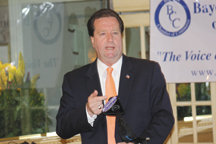Saying that the economy of the city is already starting to recover from one of the worst economic situations in modern times, Mayor Mark Smith talked about city government getting back to basics, providing essential services with few people. Addressing the Bayonne Chamber of Commerce at a breakfast meeting on June 22, Smith said leading the city into the future was a team effort.
Elected in a special election in November, 2008, and then to a full four year term last year, Smith said, “I actually knew what I was getting into. Our economy was tanking, our government was propped up with yearly one-shot revenue gimmicks and quick fixes that only kicked the can further down the road.”
“There is no disputing that we live in trying economic times.” – Mark Smith.
____________
The idea is to make government smaller. To this end, the city has reduced the number of departments and is working toward making the city more inviting and attractive to business, developers, and development, he said.
“We have successfully reduced the cost of government and reduced the number of municipal employees to the lowest level in 20 years, but without sacrificing services residents receive,” Smith said. “We’re thinking smarter, but more importantly we’re working harder.”
Reworking of employee health benefits has saved the city a quarter of a million dollars this year, and reworking other insurance programs saved an additional $500,000 this year.
“We’re aggressively seeking grants for equipment and infrastructure,” he said, noting that the new firehouse under construction was mostly funded by state and federal grants.
The city has joined with Hudson County in an energy cooperative that has saved 20 percent in the city’s energy costs. The city has taken part in a county solar panel program and has developed its own fuel station for its fleet of vehicles.
Shared services with the Board of Education and other municipalities will save additional money, he said.
Cutting debt, however, is key to Bayonne’s future, Smith said, noting that the city has not bonded since his taking over in 2008, and that the city is aggressively seeking to reduce its debt – the interest payments of which account for more than $20 million in the annual budget. He said that the city will seek to do away with short term debt and high interest debt, and refinance the remaining debt, while continuing to seek new revenue sources.
“There is no disputing that we live in trying economic times,” Smith said.
He said he’s talked to people in the private sector and union leaders, who are reporting 30 to 40 percent of members who are out of work.
Active again
“But despite these difficult circumstances, we are seeing signs of life and recovery,” Smith said. “Interest in community is picking up, developers are coming in and looking around. Projects that were on hold are active again and we have people knocking on the doors of City Hall.”
New jobs have been created through the new mall, with Walmart due to open its doors in the fall. The mall has all but one space leased out, and the opening of the Eighth Street station of the Hudson Bergen Light Rail has increased property values in the area.
The cruise port continues to operate, and the Port Authority has agreed to use the least disruptive method for raising the Bayonne Bridge, which will keep homes from being taken, while helping to bolster the port industry and jobs for the region.
The Bayonne Energy Center is due to come on line soon, which will pay more than $1 million to the city in taxes, and another $1 million for purchase of water.
The windmill project, delayed by the state, will continue shortly, which will save $200,000 a year in operation costs at the sewerage authority.
“During these difficult times when districts around the state are reacting to the loss of state aid, cuts, and layoffs, Bayonne maintained its educational services without hurting school, staff, or the educational quality children receive,” Smith said.
This positive movement came about because the city was able to work together to find innovative solutions.
“My administration values new ideas, values innovation and frank discussion,” Smith said. “We’re never afraid to try something new. We’ve learned that the old solutions do not work. There is no quick fix. Municipal government in New Jersey has to change. Taxes are too high.”
One thing government has to do is get back to basics.
“People expect their government to provide a few simple things,” Smith said. “They want us to provide police protection, fire protection, safe clean streets and solid education.”
But government has to be smaller.
“We have to have a smaller work force that does more and does it better,” he said.
